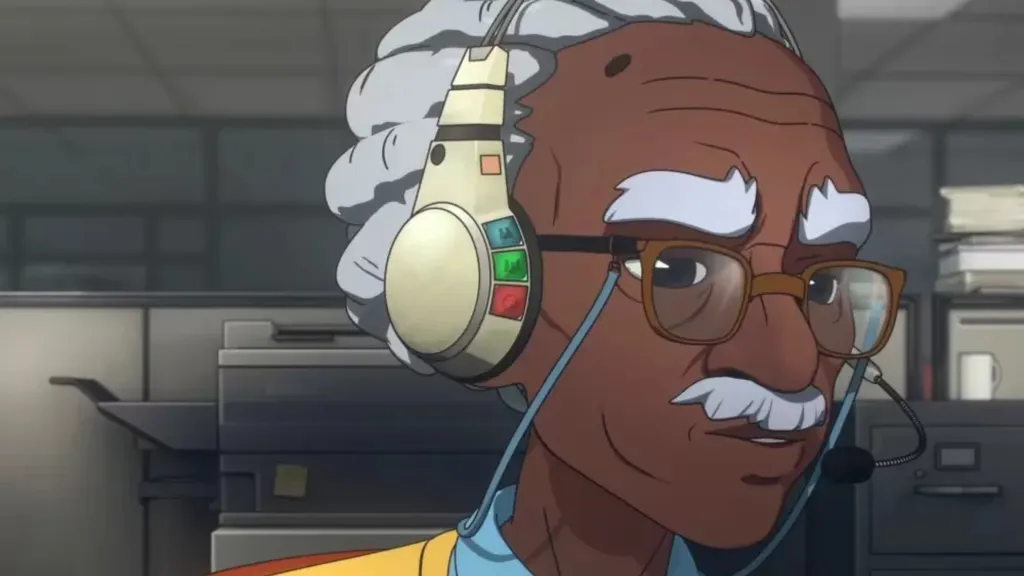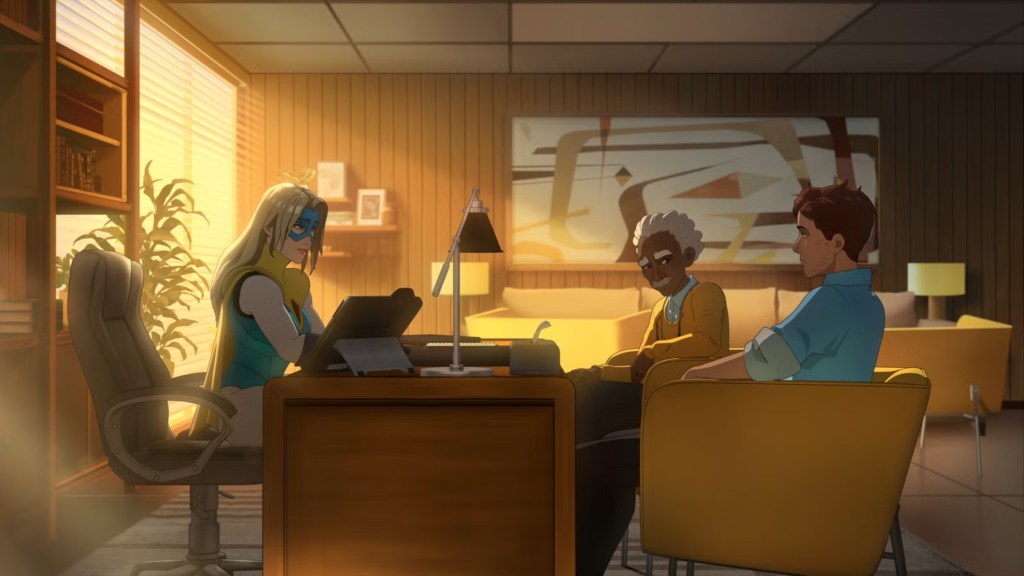Dispatch is a clever and well-constructed riff on the superhero genre, with its take on speedsters like the Flash adding a somber layer to the concept. Dispatch introduces a host of superhero archetypes in its fusion of the typically bombastic genre with standard “workplace comedy” tropes. This includes heroes who very clearly literalize their powers as extensions of their personality, like the hot-headed Flamebae or the prickly Invisigal.
Videos by ComicBook.com
One of the best examples of this – despite never actually getting to use his powers – is Chase. Played by Jeffrey Wright, Chase is Robert/the player’s guide to the world of working Dispatch at the SDN, a snarky old-timer whose advanced age is eventually revealed to be an unintended result of his own superhero past. The result is a character who brings a surprisingly tragic edge to one of the most iconic superhero archetypes and who puts a whole new light on the Flash’s power set.
Chase/Track Star’s Dispatch Role, Explained

Chase is quickly established in Dispatch as a former hero known to the public as Track Star. An unofficial babysitter to a young Robert during his tenure on the same superhero team as Robert’s father, Chase is depicted as being surprisingly elderly looking despite only being 39 years old. This is because it turns out Chase’s super speed has been draining him of his natural lifespan, aging him at an extreme rate.
By the time Chase realized what was happening, he had lost a potential decade’s worth of time. While he seems to have stabilized himself by refusing to use his powers anymore, Chase also mentions how much he misses his abilities. This also seems to play into his overt hostility with the new generation of former villains that make up the Z-Team.
It’s a sad element to the character that he quickly brushes aside when he reunites with Robert, setting up his primary role in the game as a friendly voice of reason. For the most part, Chase is a fun supporting character who delivers some hilariously coarse proclamations about his team. Underneath the surface, though, Chase literalizes one of the most tragic elements of a speedster hero archetype.
Chase’s Predicament Makes Flash Tragic In Retrospect

Super speedsters have been a fixture of the superhero genre since the Golden Age of comics, when the original Flash (Jay Garrick) rushed onto the scene in 1940. Super speed has always been a compelling and visual power, with the Barry Allen incarnation of the Flash in particular helping to revitalize the superhero genre and even establish a superhero multiverse. However, those powers also carry a potentially tragic number of metaphors.
While Flash may be super fast, he’s still incapable of being everywhere at once, and he can’t seem to keep enough of his appointments and personal events to make people think he’s anything less than a flake. He struggles to use his powers well, but ends up rushing right by the rest of his personal life. Speedsters in superhero narratives are often pushed to the breaking point for altruistic reasons and for more shallow ones alike, with shows like CW’s The Flash and The Boys highlighting both.
The inherently visual nature of the powers makes them flashy, but they also come with lots of potential costs that Dispatch and other properties have highlighted. The Flash is someone who various stories have painted on the verge of being lost to his speed, with the Justice League animated series introducing his worst fear as moving so fast that he literally leaves the world frozen still around him. Chase is a compelling and tragic example of these fears internalized, an atypical riff on the concept that highlights the cost of Chase’s powers for the sake of his previous heroic work.
Chase literally lost years of his life to his work as a superhero, giving up countless possible journeys as a result of his speed. Even after realizing the cost of them, Chase still misses what they allowed him to do and the people they let him help. It’s a somber reflection on the cost of public service and the emptiness that can set in once “the work” is finished, something that’s at play throughout Robert’s arc at the heart of Dispatch. It’s one of the best examples in Dispatch‘s first two episodes of how effective the game is at playing with superhero conventions.
How Chase Perfectly Humanizes Superheroes

While plenty of stories have underscored the challenges faced by speedsters, Chase is a good showcase for what Dispatch gets right about superheroes as a whole. While the genre has been dominant in 21st-century fiction, it’s also gone through plenty of subversive takes that are intriguing — but can lose sight of the vital character work that has always elevated the best characters. That human core is key to what makes Discord work.
The entire Marvel Universe was predicated on the idea of regular people being thrown into an absurd situation, which influenced the entire medium and made character drama a core aspect of the genre. Dispatch understands that, giving each character a power set and identity that matches their innate personality, and letting the player bounce them off one another.
Chase is a foul-mouthed friend who naturally contrasts against the sweeter Blonde Blazer, serving as a guide to the world while keeping true to the game’s sardonic tone. He’s a classic “seasoned superhero” character, filtered through a metaphor for illness or physical impediments that adds tragic layers to his place in the story. Surrounding all of that is plenty of interpersonal drama and romantic tension and comedic lyrics, and absurd takes on redemption stories courtesy of the rest of the cast. It’s an effective form of storytelling alchemy that ensures the superhero story still feels grounded.
Chase offers a more overt look at a famous power set of the genre, underscoring not just the physical toll of being a superhero but the mental and spiritual cost as well. It’s emotional and charming, funny and sad. It’s, in a word, human, which is where Dispatch is at its best. Chase is delightful in Dispatch and indicative of just how well the game understands the very human core of the superhero genre.








